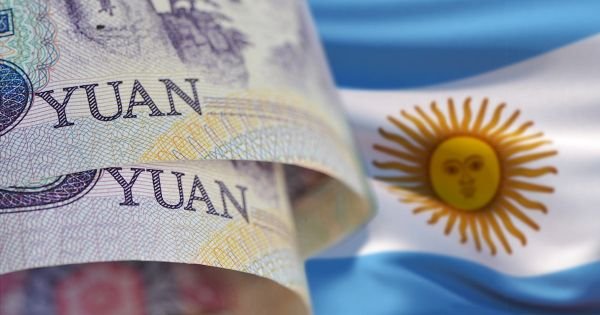Short of US dollars, Argentina advances towards trading and hoarding in Yuan
[ad_1]
Short of US dollars, Argentina advances towards trading and hoarding in Yuan
The fact that imports from China are paid in Yuan rather than dollars should help Argentina mitigate the loss of reserves in its central bank
Argentina is increasing its use of Yuan to pay for imports from China, following the renewal and expansion of a currency swap agreement with Beijing. The use of the Chinese currency in bilateral trade amounted to 1.075 billion Yuan (US$ 150.5 million) in May this year. In the first ten business days of June, transactions worth 2.045 billion yuan ($286.3 million) were recorded, according to the Central Bank of Argentina Argentine Central Bank’s report on June 15.
This increase came after the agreement signed in early June, which renewed and expanded the swap with China for 130 billion Yuan (approximately US$18.2 billion) over three years. The agreement was signed between the Argentine Central Bank and the People’s Bank of China.
The fact that imports from China are paid in Yuan rather than dollars should help Argentina mitigate the loss of reserves in its central bank. According to official data, China is Argentina’s second-largest supplier of goods, with imports in the first quarter of this year totaling US$3.158 billion.
As a result of the swap agreement with China, the central bank confirmed that it could also “carry out Yuan operations for financial stability” in the Argentine foreign exchange market, which is often affected by strong demand for dollars.
The Argentine monetary authority also announced that it holds its own reserves in Yuan in addition to the 35 billion Yuan (US$ 4.9 billion) of available funds that can be accessed through the currency swap.
The agreement signed earlier this month allows Argentina to activate an additional 35 billion Yuan from the swap, which will be released to the Argentine central bank as the initial 35 billion Yuan is utilized and “financial needs and reserve reinforcement require it,” explained the monetary authority in a statement.
The Argentine Central Bank faces severe difficulties in containing the loss of monetary reserves. Since June of last year, it has imposed restrictions on access to foreign currency for import payments, which complicates the activities of companies that rely on importing intermediate goods for production.
[ad_2]
Source link




